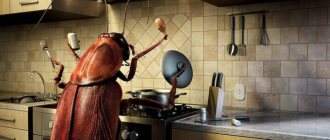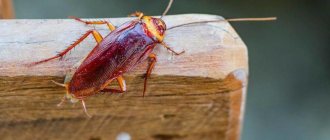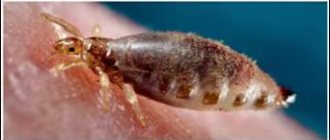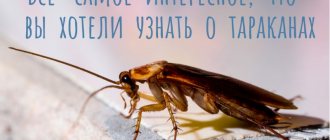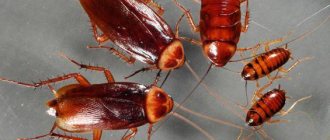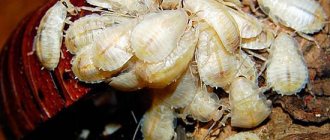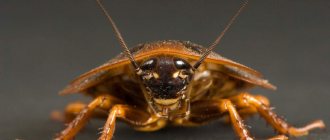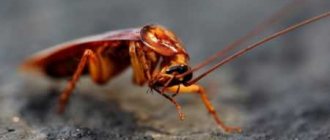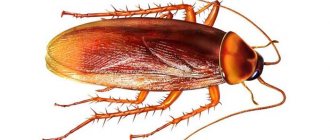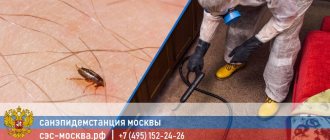The giant cockroach (Blaberus giganteus) is one of the largest cockroaches on the planet. It lives in tropical rain forests of Central and South America. The giant cockroach prefers caves, tree hollows, and cracks in rocks as shelters. In nature, it spends most of its time searching for food, rummaging in the forest floor or bat guano. Omnivorous, but prefers plant foods. The giant cockroach is kept in terrariums as a pet or bred as a food crop.
Nutrition
The giant cockroach is omnivorous - it feeds on decaying plants, fruits, seeds, and animal remains (carrion). In caves with bats, guano eats them. In captivity, it prefers sweets and meat, as well as food with a high starch content. A high intake of carbohydrates is necessary for males to attract females.
The Death's Head cockroach is not scary at all
The homeland of these large cockroaches is Cuba. Cuban cockroaches have long settled in insectariums, or aquariums for insects (they are also called “dry aquariums”) of Russian lovers of entomological exotics. They are favorites of adherents of this specific hobby because Blaberus craniifer (this is its Latin name) is quite interesting and attractive from a decorative point of view. This photo shows that it has a specific color on its dorsal chitinous shield, where the human skull is visible (hence the name “death’s head” cockroach).
It is grown not only for aesthetic purposes, but also for purely practical ones: cranifer blaberus is a treat for other pets:
- amphibians (large toads);
- reptiles (snakes and lizards);
- other insects (ants, etc.).
Experienced keepers of exotic animals warn: before feeding this cockroach to anyone, it must be killed by pressing well on the chitinous shell. Because the cranifer blaberus, like any living creature, will fight for life to the last, and its shell is quite hard. And the process of consuming a still living insect can result in damage to the digestive tract of the one who feeds on it.
If the larvae of the “death’s head” cockroach are grown for food supply, then the process is greatly simplified. In general, everything is like in living nature: either you eat or they eat you.
By the way, in the wild, in Cuba or in other humid tropical or subtropical forests, these insects feed mainly on plant foods. This is also taken into account when breeding them in aquariums.
Reproduction and development
Viviparous species. Sexual dimorphism is weakly expressed. The only way to distinguish gender is to examine the posterior end of the abdomen, where the small appendages are located. In males, small needles are visible between these appendages; in females, these needles are absent. Individuals of different sexes behave differently; for example, females never participate in courtship rituals. The young develop in the female's ooteca. Incubation lasts about 2 months. Usually, up to 30 larvae about 0.6 cm in size are born from one female. At first, the larvae feed on the ootheca, after eating, they burrow into the substrate and remain in it until the first molt.
There are three stages of development: egg, nymph and adult. Cooler temperatures and lower humidity can result in delayed maturation and increased shedding.
Contents of Blaberus giganteus:
Necessary conditions for a giant cockroach: The container is horizontal, it is best to increase the usable area using various designs. Temperatures are around 28-32 degrees Celsius, I know from personal experience that they can tolerate temperatures of 25-27 degrees, but they multiply slowly. Humidity about 60%.
There are several methods described on the Internet for keeping this species, the first is using a moisture-intensive substrate, decorations and other design elements, and the second is keeping them on egg trays, similar to keeping marble cockroaches .
Let's look at the first method : Here we are offered to pour a layer of substrate, for example coconut, on the bottom, install decorations in the form of branches, sticks and other things, keep the substrate moist, and spray it with a spray bottle. The advantage of this method is the beauty of the content and proximity to natural conditions. Disadvantages: the need to replace the substrate, mold, mites, there is no way to estimate how much small stuff is in the terrarium.
The second method that I use: A terrarium or other container is equipped, as for marble cockroaches , and egg trays are installed. I also added a small jar of coconut substrate to the container, which I keep moist. The container is closed on top with a lid, which helps maintain humidity at a level in the absence of a large amount of wet substrate. Advantages of the method: simplicity, hygiene, the ability to catch larvae of any age. Disadvantages: I find it difficult to name any disadvantages other than aesthetic ones.
Cockroach farm
Some owners of exotic animals and insects, such as snakes, lizards, spiders and the like, breed hissing cockroaches as high-calorie live food for their pets. It is very convenient and profitable. One female Madagascar hissing cockroach can produce more than 750 offspring in her lifetime. And if there are a lot of females, then you can organize an entire farm at home to grow live food. Cockroaches grow quickly, the cost of feeding them is small, the females are very fertile, so exotic animals are provided with food for a long time. Now you know that Madagascar cockroaches can also bring profit. The content, most importantly, must be made taking into account all requirements.
But in some countries these insects have become a delicacy for the people themselves. For example, in Thailand, gourmets willingly order cockroach dishes and sincerely enjoy it. Cockroaches contain a lot of calories, protein and other substances beneficial to humans, and the taste of Madagascans is reminiscent of tender veal and chicken.
Madagascar hissing cockroaches are among the exotic animals that people breed at home. The popularity of cockroaches is increasing, and the demand for them is constantly growing. In big cities, such a pet can be seen in every 50th apartment. The neighbors are not very happy with such animals, especially when the cockroaches manage to escape.
References
- ^ a b George Beccaloni, David S. Eads. Blattodea species file - Blaberus giganteus
- ^ B s d e g Huang. CY, Sabry, Z.L. and Moran, N.A. 2012. Genome sequence of Blattabacterium sp. Strain BGIGA, endosymbiont of the cockroach Blaberus giganteus. Journal of Bacteriology. 194: 4450-4451.
- ^ ab Allpet Roaches
- ^ abc Stephen W. Bullington Biology and Captive Breeding of the Giant Cockroach Blaberus giganteus Archived March 4, 2016, at the Wayback Machine.
- ^ab Smith, AJ and Cook, T, J. 2008. Host specificity of five species of Eugregarinida among six species of cockroaches (Insecta: Blattodea). Comparative parasitology. 75: 288-291.
- Kambhampati, S. 1995. Phylogeny of cockroaches and related insects based on DNA sequences of mitochondrial ribosomal RNA genes. Proceedings of the National Academy of Sciences of the United States of America. 92: 2017-2020.
- ^ B s d x e South, SH, Home, CM, Moore, AJ, Simpson, SJ and Hunt, J. 2011. Male Cockroaches Prefer a Higher Carbohydrate Diet That Makes Them More Attractive to Women: Implications for Studying Condition Dependence. Evolution. 65: 1594-1606.
- ^ab Banks, W.M. 1969. Observations on the cultivation and maintenance of Blaberus giganteus (Orthoptera: Blaberidae). Annals of the Entomological Society of America. 62: 1311-1312.
- ^ abcdefg Bidochka, MJ, St Leger, RJ, and Roberts, DW 1997. Induction of new proteins in Manduca sexta and Blaberus gigantus as a response to a fungal problem. Journal of Invertebrate Pathology. 70: 184-189.
- ^ abcdef Sreng, L. 1993. Cockroach mating behavior, sex pheromones and abdominal glands (Dictyoptera, Blaberidae). Journal of Insect Behavior. 6: 715-735.
- ^ abcdefgh Günther, M., and Weimann, T. 2011. Load distribution between three legs on a wall: model predictions for cockroaches. Archive of applied mechanics. 81:1269–1287.
- ^ abcdefghij Bruce, A. L. and Banks, W. M. 1973. Muscle metabolism of the cockroach Blaberus giganteus. Annals of the Entomological Society of America. 66: 1209-1212.
- ^ abcdefgh Banks, W. M., and Randolph, E. F., 1968. Free amino acids in the cockroach Blaberus giganteus. Annals of the Entomological Society of America. 61: 1027-1028.
- Hogue, Charles Leonard (1993). Latin American Insects and Entomology - University of California Press. item 175
- Media related to Blaberus giganteus at Wikimedia Commons
Hemolymph
Hemolymph is a fluid used in the circulatory systems of some arthropods, including insects, to fill the internal hemocoel. [13] Hemolymph consists of water, inorganic salts and organic compounds. [13] Some of the organic compounds are free amino acids, and their content varies by species, depending on which amino acids are present and their total concentration. [13] Amino acids present in B. giganteus are
include alanine, arginine, cysteine, glutamic acid, glycine, histidine, leucine, proline, threonine, tyrosine and valine.
[13] The amino acids present in the highest abundance were glutamic acid, alanine, glycine, and histidine. [13] The total amino acid concentration is approximately 265 mg/100 ml hemolymph. [13] The presence of alanine, cysteine, glutamic acid, leucine, proline, tyrosine and valine is characteristic of various cockroach species such as Blattella germanica and P. americana
.
[13] The presence of arginine, however, is species specific for B. giganteus
. [13]
Behavior
Insects are nocturnal. During the day they hide in shelters and at night they go out in search of food. The American cockroach can bite in self-defense. Bites are not particularly painful, but if pathogenic bacteria get into the wound, there can be unpleasant consequences.
Insects are omnivores and eat whatever they find. They eat any baked goods, citrus fruits, bananas, meat, sausage, candy and cereals. They have a special passion for fermented foods. They feast on cheeses and beer with obvious pleasure.
In the absence of food supplies, the red cockroach is content with paper, leather, plants and animal corpses. It also eats its dead or wounded brethren with gusto.
For what reasons do they appear in a particular residential area?
There are several reasons:
unsanitary conditions. Always dirty floors, unwashed dishes, cluttered corners, food residues lying around in different places (this could be spilled sugar or flour);
things from trips. An insect can come to your home in a travel bag, having entered it from a hotel or train carriage;
dysfunctional neighbors
It doesn’t matter which side the sluts are next to you (above, below, through the wall). Cockroaches will definitely get into your apartment from the ventilation hole or cracks in the walls and floor; faulty water and sewer pipes
faulty water and sewer pipes
Small damp places under the drop and warmth - this is a real cockroach paradise. As long as there is moisture nearby and the temperature in the apartment does not drop below 10 degrees, the Prussians will be ready to live with you forever.
